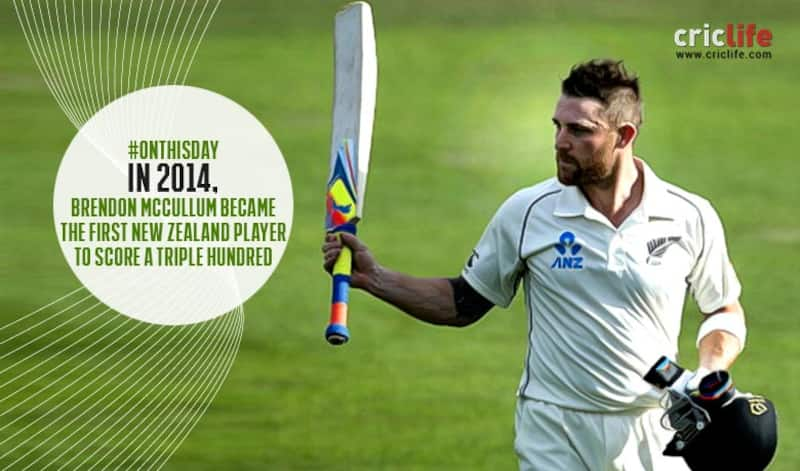
Abhishek Kumar
Abhishek Kumar is an aspiring cricket statistician and reporter with CricketCountry. He can be followed at @abhik2593.
Written by Abhishek Kumar
Published: Feb 18, 2016, 12:31 PM (IST)
Edited: Feb 18, 2016, 12:31 PM (IST)

It was a day scripted in the history of New Zealand cricket when their skipper Brendon McCullum made Indian bowlers toil by smashing a triple hundred during the second innings of the second Test at Wellington. Perhaps India could have won that match had McCullum not come in their way. It was one of those memorable matches where several new records were made and a new beginning for New Zealand in Tests against India was marked.
This was the second and the final Test of the series. The first one was won by New Zealand and the hosts were best placed to beat India on their home soil after 11 years. Prior to this series, New Zealand had only won against West Indies at home in three-Test series in late 2013 and beaten Zimbabwe and Bangladesh in two-match series in their backyard but couldn’t excel against any big team after the 2005-06 series against West Indies.
The Test started with a toss win going in favour of India, who asked New Zealand to bat first on a pitch giving a lot assistance to fast bowlers. Indian bowlers did a commendable job by bundling out Kiwi team at the score of 192 in the first innings. Their pacers did well as Mohammad Shami took four wickets while Ishant Sharma grabbed six wickets.
In response, Team India batted quite well on the unfamiliar track by getting huge lead on the score board with their total stretching to 438. Shikhar Dhawan gave a good start at the top by scoring 98 and his effort was then followed by Ajinkya Rahane’s stroke-filled hundred along with skipper MS Dhoni’s 68 run cameo. India ended their innings with the lead of 246 runs, which seemed enough for them to win the game and draw the series. But Kiwi skipper had something else in his mind.
New Zealand batsmen didn’t have a good start with half of the team going back to the pavilion at the mere score of 94. India were in firm control over the match but here on things took a dramatic turn. McCullum’s epic innings of 302 began which was well supported by BJ Watling who scored 124. Indian bowlers looked clueless and they were unable to find a breakthrough at the either end.
Even after the fall of Watling, James Neesham, another centurion of the match, kept frustrating the Indian bowlers. On the other hand, McCullum kept dominating with his powerful shots all around the Basin Reserve Stadium. It was not an aggressive knock but was a very mature one by the captain who avoided unnecessary risks and gave respect to good deliveries. Though he was favoured with a couple of lifelines during his innings, as he was dropped twice by Virat Kohli and Ishant, nothing can be taken away from him for that special knock.
He played 559 balls to score 302 runs with 32 boundaries and four sixes. With these numbers, one can easily say that this is not a typical McCullum style knock. He completed his triple century on the last day of the match and became the first Kiwi player to do that in Tests and second batsman overall to reach this landmark in second innings after Pakistan’s Hanif Mohammad. Just after two balls reaching his milestone, he fell to Zaheer Khan but till then he had taken the game way beyond India’s reach. McCullum’s innings lasted 775 minutes, which was the eighth longest innings in Test history. New Zealand scored 680 runs and declared, which was the highest team total for any team in second innings and set a huge target of 435 runs, which was an improbable one on the final day of the match with only 55 overs left.
In the final innings, Kohli remained unbeaten 105 as India ended at 166 for three wickets and the match finished as a draw. New Zealand won their first Test series at home against India after 11 years and it came just because of their skipper McCullum.
(Abhishek Kumar is a cricket devotee currently staffing with Criclife.com. He can be followed at abhicricket.kumar and @abhishekkr2593)
This website uses cookies so that we can provide you with the best user experience possible. Cookie information is stored in your browser and performs functions such as recognising you when you return to our website and helping our team to understand which sections of the website you find most interesting and useful.
Strictly Necessary Cookie should be enabled at all times so that we can save your preferences for cookie settings.
If you disable this cookie, we will not be able to save your preferences. This means that every time you visit this website you will need to enable or disable cookies again.
